Plot
Otello Celletti is a war veteran from a small town in Latium. He has been unemployed since the end of the war and lives with his father, wife Amalia and their son, at the expense of his brother-in-law. When he is offered a menial job in the town's markets, Otello refuses in disdain. After fiercely insisting with the town's Mayor and by leveraging his veteran status, Otello eventually obtains a position with the local traffic police. Though he performs his duties poorly, Otello still abuses his authority to exact petty revenge upon those who had been teasing him while he was jobless.
One day, Otello finds himself offering roadside assistance to famous actress Sylva Koscina. He indulges in pleasantries with the actress, inviting her for coffee and opting not to fine her for missing her driving license and car documents. That night, during a guest appearance on the television program Il Musichiere in front of 18 million viewers, Sylva publicly greets Otello but, at the insistence of host Mario Riva, also reveals how Otello let her go when he should have fined or even arrested her.
Following the incident and under political pressure, the Mayor berates Otello for tarnishing the public image of the police force, threatening to fire him. Some time later, Otello catches the Mayor himself speeding on a dangerous curve. Believing his integrity is being tested, Otello chases the Mayor on his way to meet his mistress, eventually issuing a speeding ticket, which involuntarily exposes the Mayor's extramarital affair. Angered, the Mayor suspends Otello and appeals the fine.
Otello decries his treatment with the local monarchists, who choose him as their candidate at the upcoming mayoral election opposite the current Mayor. In a private meeting with the Mayor's party members, an invigorated Otello threatens to expose knowledge of years of mismanagement by the Mayor's administration. In response, the Mayor produces evidence of compromising information about Otello and his family: Otello's sister, who was thought to be a masseuse in Milan, is instead a prostitute; Otello himself is not legally married to Amalia, as her legal husband in pre-divorce Italy still lives; and Otello's father, whom he believed a Great War hero, had instead served time for accidentally shooting King Victor Emmanuel III, a fact that if known would alienate the monarchists.
At the next day's appeal hearing, Otello relents and exonerates the Mayor, pretending he unduly fined him out of a faulty odometer reading and also withdrawing his candidacy. Some time after being reinstated as a traffic policeman, Otello is shown making way for the Mayor as he speeds once again along the same curve, only for the Mayor to crash his car and be hospitalized, thus serving poetic justice to Otello.

Alberto Sordi was an Italian actor, voice actor, singer, comedian, director and screenwriter.

Sylva Koscina was a Yugoslav-born Italian actress, maybe best remembered for her role as Iole, the bride of Hercules in Hercules (1958) and Hercules Unchained (1960). She also played Paul Newman's romantic interest in The Secret War of Harry Frigg (1968).

Luigi Zampa was an Italian film director.

The Sign of Venus is a 1955 Italian comedy film directed by Dino Risi and starring Sophia Loren. It was entered into the 1955 Cannes Film Festival.
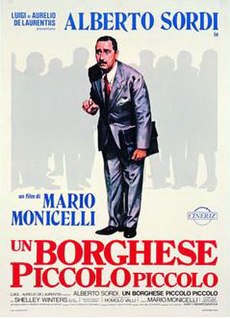
An Average Little Man is a 1977 Italian drama film directed by Mario Monicelli. It is based on the novel of the same name written by Vincenzo Cerami. The movie mixes "Comedy Italian Style" with psychological drama tragedy. The film was an entrant in the 1977 Cannes Film Festival.
Rodolfo Sonego was an Italian screenwriter.
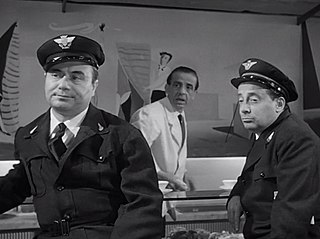
Mario Riva was an Italian television presenter and actor. He appeared in 51 films between 1941 and 1960.

Marisa Merlini was an Italian character actress active in Italy's post-World War II cinema. Merlini appeared in over fifty films during her career, which spanned from World War II to 2005. In Luigi Comencini's 1953 film Pane, amore e fantasia, she portrayed Annarella, a village midwife, who marries the local police marshal, played by Vittorio De Sica.
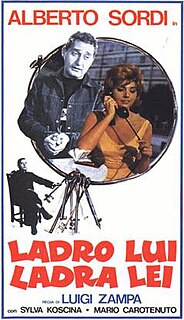
Ladro lui, ladra lei is a 1958 Italian comedy film directed by Luigi Zampa. Starring Alberto Sordi and Sylva Koscina, it tells the story of a young woman in Rome who is first sucked into a life of crime by a released convict and then has an awakening of conscience.
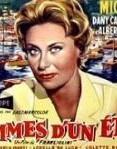
Girls for the Summer is a 1958 Italian romantic comedy drama film directed by Gianni Franciolini, based on story by Alberto Moravia. The film stars Alberto Sordi, Michèle Morgan, Marcello Mastroianni, Sylva Koscina, Gabriele Ferzetti, Dorian Gray, Franca Marzi, Franco Fabrizi and Jorge Mistral.
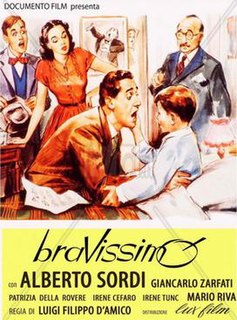
Bravissimo is a 1955 Italian film, starring Alberto Sordi and directed by Luigi Filippo D'Amico.

Policarpo is a 1959 Italian comedy film directed by Mario Soldati. It was entered into the 1959 Cannes Film Festival.

In Olden Days is a 1952 Italian anthology film.

A Day in Court is a 1954 Italian comedy film directed by Steno and starring Peppino De Filippo, Silvana Pampanini, Sophia Loren, and Alberto Sordi. The film is an anthology, consisting of a day's cases before Judge Salomone Lo Russo in a court in Rome.
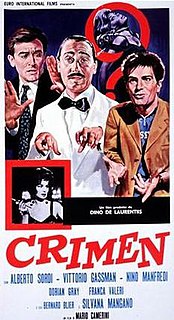
Crimen is a 1960 Italian whodunit-comedy movie by Mario Camerini.
Ennio Guarnieri was an Italian cinematographer.
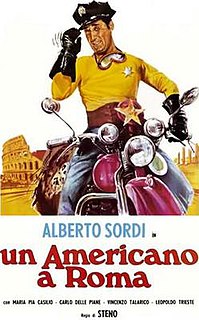
An American in Rome is a 1954 Italian comedy film directed by Steno. The film consists in a satire of Americanization, and it was referred as "a milestone in the evolution of Italian self-identification". It starred Alberto Sordi, with a young Ursula Andress in a minor role.

Il marito is a 1957 Italian-Spanish comedy film directed by Nanni Loy and Gianni Puccini, at their second and last collaboration after Parola di ladro. Alberto Sordi, who was author of the story together with Rodolfo Sonego, submitted the script to Angelo Rizzoli, that was not at all enthusiastic about the subject. Later, he met a Spanish producer, married with eleven children, who recognized himself in the story, so the film, which was initially set in uptown Rome, was shot in Madrid. In Spain the film was released with the title El Marido.

Totò nella luna is a 1958 Italian comedy science fiction film written and directed by Steno. The script was co-written by Lucio Fulci. The film starred Sylva Koscina, fresh from her appearance in the 1958 blockbuster Hercules.

The Letters Page is a 1955 Italian comedy film directed by Steno, starring Alberto Sordi. Actually the film's full title is Piccola posta ovvero: cercasi vecchia con dote. Co-writer Lucio Fulci has a cameo appearance in the film. Cameraman Delli Colli's wife (Alexandra) years later wound up co-starring in one of Fulci's later slasher films, The New York Ripper (1982).
This page is based on this
Wikipedia article Text is available under the
CC BY-SA 4.0 license; additional terms may apply.
Images, videos and audio are available under their respective licenses.


















